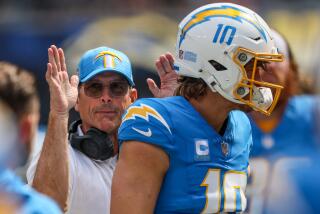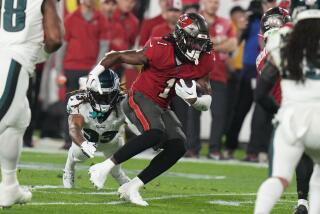FALCON TO THE CORPS : Marine Capt. Eddie Meyers Meets a Waterloo as McCallum Plays; but Next Year, the Waiting Is Over
- Share via
SAN DIEGO — As a senior at the Naval Academy, he almost considered taking drugs, having an affair or doing something that would get him thrown out of school.
He never followed through, of course, but Eddie Meyers would have loved an honest way to free himself from a lengthy military commitment so he could play pro football.
Nearly five years later, Meyers, now a Marine captain stationed at Camp Pendleton, is still waiting to take his first handoff in a National Football League game.
As he watches Napoleon McCallum, his friend and former service academy protege, perform on weekends for the Raiders, Meyers feels deeply frustrated.
Three times he has appealed to the Marine Corps and three times he has been denied in his attempt to be allowed to pursue a career with the Atlanta Falcons, with whom he has practiced each of the last five summers.
Now, with seven months remaining in his tour of duty, the 28-year-old Meyers is bitterly reconciled to remaining at Camp Pendleton until his military obligation is completed next May.
“I’m a hell of a lot hungrier now than I was when I finished at the Academy in 1982,” Meyers said. “I’ve been waiting a long time. It’s been driving me crazy for five years.”
Despite--or maybe because of--the delayed start of his football career, Meyers has ambitious plans to catch and surpass his contemporaries in the NFL.
He expects to be a millionaire by the age of 35.
Now at work on a master’s degree in finance, he hopes to work on Wall Street between seasons. Eventually he expects to become an investment banker, with a salary comparable to the richest in pro sports.
Along the way, Meyers intends to prudently invest his football earnings, avoiding what he calls “depreciating assets,” meaning flashy cars, clothes and plushly furnished homes.
His bank account and life style are somewhat more modest these days. The Meyers family of four is sheltered in a three-bedroom house on the base. Meyers, who works as a supply officer, engages in body building on his lunch break and attends school at night. He estimated that his life style would translate to $30,000 in the civilian world.
“We live like most people, paycheck to paycheck,” said his wife, Jan, pregnant with her third child.
“In a way, it might be easier if it was just me,” Meyers said. “I’ve got so much drive, I’m like a man on a mission.
“I feel like I’ve lost so much, I don’t know how I can make up for those five years out of my (football) career. Nap (McCallum) is going to be working on his second million before I get started.”
Meyers never has been inclined to second-guess himself, but even if he were, a quick study of his life makes it plain there isn’t much he could have done differently to have smoothed his course toward an NFL career.
As a 5-foot 6-inch, 185-pound high school linebacker who played running back in only a couple of games as a senior, Meyers was not recruited to play college football.
He was offered a chance to attend the Navy Prep School in Newport, R.I., as a condition of admittance to the Naval Academy.
After two years in Annapolis, his athletic career was beginning to show promise, and he could have transferred to another school without incurring an obligation to the military. The catch was, no other school wanted him.
Although he set Navy records for rushing yardage in a game, season and career, Meyers never viewed himself as a pro prospect until he played in postseason all-star games in the company of players like Marcus Allen, Darrin Nelson and Butch Woolfolk.
Seven pro teams expressed an informal interest in him, but none was willing to draft him because of his five-year military obligation.
It was only when he realized that he might have a shot at a million-dollar football career that Meyers thought fleetingly about getting himself tossed out of Annapolis.
Meyers subsequently married a woman who had been his childhood sweetheart, antagonist and adviser. Their relationship, although clearly loving, is full of needling and teasing.
A chunky Meyers is about 15 pounds over his playing weight of 203. He said it’s because Jan is pregnant, and he always gains when she is expecting.
Jan put it differently. “It’s because he comes home at night and fills up on nachos or pizza or ice cream sodas,” she said.
Meyers winced but didn’t argue. He said he’s as fast as ever, about 4.55 in the 40-yard dash. If his layoff has hurt him, it’s more in the area of instincts, he said.
In training camp this summer, he found his ability “to look, read, feel and go” wasn’t as focused as he would like. But he expects that ability to return as he pursues his comeback.
Meyers used his leave to spend 43 days in the Falcon training camp this year. Teammate William Andrews told him he was nuts. Meyers, however, was thinking of the future.
“I really love the game,” he said. “I don’t care if it’s 95 degrees and 95% humidity during camp, I’m having a ball. That’s what I’m living for. Football is a joy to me.”
Meyers was less than overjoyed when the Marine Corps commandant, Gen. P.X. Kelley, recently ruled against his request to be transferred to Atlanta for the remainder of his tour of duty.
It was the third appeal and the third disappointment for Meyers.
In 1982, he had sought to have his Marine tour extended in exchange for six months off each year to play football. For each season he played, he would have owed the Corps a year of duty. His request was denied.
Two years later, he tried a different approach. This time, he attempted to transfer from active duty to the reserves, which would have given him time to pursue a football career. Again, he was turned down.
This year’s turndown was a surprise because of the decision by Navy Secretary John Lehman allowing McCallum to play for the Raiders in off-duty hours while stationed at Long Beach.
“Lt. Meyers (he has subsequently been promoted) incurred his military obligation to his country when he sought and accepted a free, four-year education at the Naval Academy and a commission in the Marine Corps,” Kelley’s ruling said.
“To approve his request for a cross-country transfer to Atlanta, where there is no appropriate billet for him, would be a shameful waste of scarce defense dollars and a violation of the public trust. He is a school-trained supply officer who is filling a billet at Camp Pendleton, which requires schooling, rank and expertise.”
Meyers said he believes it was easier for the Navy to cancel McCallum’s orders and transfer him to Long Beach because he was just beginning his tour of duty after finishing at the Naval Academy last June.
In retrospect, Meyers said, he should have chosen the Navy instead of the Marines for his five-year military commitment.
He selected the Marines because he wanted to be a supply officer, and he thought he had a better chance to become one in the Marine Corps. As a supply officer now, he is charged with seeing that Camp Pendleton has all the material it would need in the event of war.
Had he chosen to serve in the Navy, Meyers feared he might have spent years at sea, which would have hampered his attempt to stay in prime physical condition. He recalled the case of former Navy star Joe Bellino, whose football career was thwarted in part by extended sea duty.
Meyers contends that there is a job at a Marine base in Albany, Ga., similar to his job at Pendleton. Albany is about two hours by car from Atlanta.
“What I really believe is that the Corps is fearful of establishing a precedent of allowing a Marine with a special talent to put in for transfer so he could have another career (in off-duty hours),” Meyers said.
A Marine spokesman in Washington declined to discuss the background of Meyers’ case, saying that the commandant’s ruling should be self-explanatory.
Meyers remains on good terms with McCallum, who invited him to attend a recent Raider game. They frequently talk by phone.
“I’m sure Nap doesn’t feel any guilt,” Meyers said. “He shouldn’t.”
Meyers has known McCallum for about five years. After his graduation from the academy, he spent a season as an assistant coach and became friendly with McCallum, then a freshman.
“Nap has grace and strength and great ability,” Meyers said. “He never was fleet of foot, but I tried to help him increase his speed by giving him some new exercises. I think he’s still about 4.7 in the 40, but he’s doing great with the Raiders.”
A weightlifting devotee, Meyers tried to persuade McCallum to do extra work on his legs and hips. He believes many athletes fail to properly develop their hip muscles.
“When you run a long distance, the hips get tired first,” Meyers said. “Then the knee lift goes down, the stride decreases and finally you lose speed.”
Meyers said he ran a 4.55 in the 40 this year, comparable to his best college time.
Despite his bitterness, he believes his absence from football may work to his advantage now.
“His mind is fresh and his body is strong,” his wife said. “He’s coming into his prime physically at an age when many running backs are all beaten down.”
He doesn’t mind doing it the hard way, the physical way.
Former Navy Coach George Welsh advised him not to take so many hits, but Meyers always preferred to run over, rather than around tacklers.
A few years ago, Neal Musser, a Falcon linebacker, flattened him during a drill in training camp. When Musser uttered the obligatory line, “Welcome to the NFL,” Meyers laughed and trotted back to the huddle.
“We became good friends,” Meyers said. “Neal said he hated to hit me because I always hit like a linebacker, not like a running back. He didn’t think runners should hit that hard.”
Meyers knows the five years away from football have created a gap between him and players who will just be coming out of college. But he expects to close that gap rapidly at training camp next summer.
He is pleased at the Falcons’ strong start this year. For selfish reasons, he wants Atlanta Coach Dan Henning to keep his job because Henning has been in charge the last four years and knows Meyers’ abilities. A new coach might be less inclined to grant him a fair chance, Meyers believes.
His contractual status with the Falcons is not entirely clear.
Before the 1982 collective bargaining agreement, Meyers agreed to a three-year contract with two option years. The package would have been worth about $500,000 but has never been put into effect, Meyers said. He has received only a signing bonus and the standard training camp per diem.
He would like to negotiate a new deal but recognizes he has no leverage.
“It’s an unusual situation,” said Tom Braatz, Atlanta’s scouting director. “The NFL has a rule that a player who signs a contract and doesn’t perform while he has a military obligation, the contract is put on hold. I’m sure if Eddie makes our team, we’ll sit down and talk with him.”
Braatz speculated that Meyers has at least a 50-50 chance of making the Falcons next year. His chances will escalate if the Falcons don’t draft a running back in the first round.
“He’s always been right on the verge of making our team when he had to return to the military,” Braatz said. “And he’s going to get a better look next year than he’s had before.
“Eddie is a good receiver and blocker and has that willingness to play on special teams. He’s going to be 28, but he’ll be like a 1987 model with few miles on him.”
For the moment, all he has are his dreams.
In the course of his daily lunch-hour workouts, Meyers envisions himself in a Falcon uniform. He doesn’t run for short gains. He usually scores a touchdown.
“You gotta be hungry, you gotta think six points,” he said. “When I get that ball, I’m thinking, ‘I’m breaking this one. I’m gonna go all the way.’ ”
Meyers has long been an advocate of visualization.
“If you can see it, you can make it happen,” he said.
He traces his belief in visualization to his biggest college game, when he gained 278 yards in 42 carries and scored 4 touchdowns against Army. After that game, he said to himself, “Damn, if I can do that once, let’s make it happen again.”
He never quite matched that performance, but did have an excellent senior year, gaining more than 1,300 yards, even though he missed three games.
“I’m going to be a lot better as rookie in 1987 than I would have been right out of the academy,” he said. “I’m going to achieve in two or three years what would have taken me five years at the start.”
In a sense, he’s always been playing catch-up.
He played football against the better judgment of his mother, who was fearful because of his size.
Referred to as Charlie’s little brother, he was a linebacker in high school in Pemberton, N.J. He didn’t get a chance to play running back until his senior season, when he impressed the coach by returning a kickoff 100 yards.
With little or no exposure before college recruiters, Meyers had no offers to perform at a football factory. He received a partial scholarship offer from Colgate but decided the Naval Academy presented more promise.
He became a starter as a sophomore and gained 99 yards in a game against Notre Dame.
In his final year in Annapolis, Eddie and Jan joked about having an affair to expedite the completion of his Navy career, but in serious moments she supported his decision to graduate and has continued to bolster his spirits.
“I had an image that I didn’t want to destroy,” he said. “I had a million dollars staring me in the face, but I didn’t want to get mixed up in something I might regret later. I had worked too hard while I was in the academy. I decided--we decided--to go through proper channels and see what would happen. We have found out. Nothing.”
Meyers prefers not to dwell upon what he calls the “couldas, wouldas and shouldas” of his life. He would rather think ahead. And he thinks in grandiose terms, with no objections from Jan.
“I hope to make $1 million a year or more as an investment banker one of these days,” he said.
“If I had been playing pro football since I was 23, I might have made something like $3 million in my NFL career. In an economic sense, I look at football as a steppingstone to some financial security.”
He expects to play five years in the NFL, working in the off-season in the securities industry, either in Atlanta or New York.
After pro football, he wants to devote full-time to the securities business while pursuing the dream that fires many of the brightest Ivy League business students--investment banking.
“I’m going to complete my masters in finance, then become a certified financial analyst and a licensed broker,” he said, leaving no room for being side-tracked or denied on appeals. He is just as determined to avoid the trap of spending big sums on cars, a fancy house and the trappings of success.
“I’m sure if I had a lot of money when I was in my early 20s, I’d have thrown away a lot,” he said. “But I’m more mature now, and my goals are different. I want to accumulate some capital. I want go for the gusto and get that unearned income that successful investors enjoy.”
He might indulge in an ice cream soda now and then, but Meyers is clearly ready to look, read, feel and go all the way from the halls of Montezuma to the great Yuppie dream of financial independence.
More to Read
Go beyond the scoreboard
Get the latest on L.A.'s teams in the daily Sports Report newsletter.
You may occasionally receive promotional content from the Los Angeles Times.










